Una sesión de intercambios con mujeres que trabajan en la pesca en Hann en búsqueda de soluciones para enfrentar la globalización
Las mujeres de un grupo de interés económico (GIE) en la zona de desembarco de Hann en Senegal querían intercambiar con Mundus maris sobre temas que les preocupaban primordialmente y sobre las soluciones que llevan adelante según sus propias perspectivas. Por encima de todo, tenían la intención de obtener consejos, sugerencias sobre otras opciones para ayudarles a lograr sus objetivos y cómo preservar los logros de sus esfuerzos.
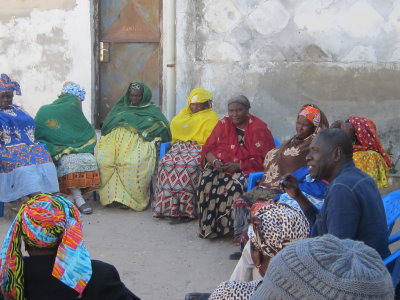
As announced earlier, Mundus maris is dedicating part of its efforts and time to gender issues in artisanal fisheries. Under this heading, a report has already been published about findings in Guinea. Already in the course of February 2018, the women in Hann had made contact, because they were aware of our commitment to women in fishing. They requested a meeting with Mr Aliou Sall, vice president of Mundus maris based in Senegal. It was finally on March 1, 2018 that this work session was held at the Hann landing pier where these women, grouped into a GIE named PARASE, gave him a warm welcome.
After an introduction of the leaders of this initiative by Mrs. Khady SARR, the Secretary General, it was Mr. Sall’s turn to explain in detail the vision and mission of Mundus maris with regard to the fishing communities and marine ecosystems. general and women-specific issues in fisheries in particular.
Very rich exchanges followed. Women particularly wanted to express themselves, on the basis of facts illustrated whenever necessary, on
(i) the way in which they live this process of globalisation, the impacts on their daily lives and especially
(ii) the strategies that they develop in the way of dealing with them through the own answers in order to stay put in this sector.
Among other things, they raised two major issues that worry them.
Firstly, the conditions are increasingly difficult to access the raw material including from their own family fishing units in the face of competition, depending on the species in question, of exporting plants, large wholesalers.
Secondly, there is the lack of control of informal credit networks in a context of increasingly public disengagement, in favour of a growing importance of the private sector to the detriment of the public.
In this regard, the women alluded to the fact that the liberalisation of the economy is not followed by a control of certain practices, such as the current interest rates of usurers, who increasingly control the informal financial markets.
They denounce the practice of usurious credit rates, which can reach between 60 and 80% interest per year with total success in recovery at the wharf level. This can largely be explained by the difficulties of the formal credit sector (traditional banks such as CNCA as well as the mutual funds established lateron in Senegal) to respond satisfactorily, adapted to the specific needs of women in a sector like artisanal fishing. These two effects combined have a negative impact on the women’s working conditions, thus calling into question a leading role and consequently the prestige they have always enjoyed in artisanal fishing.
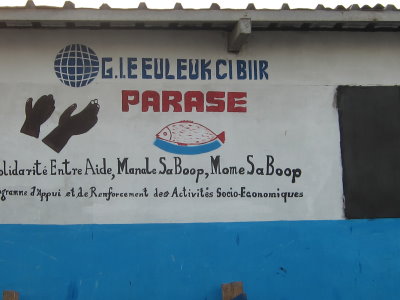
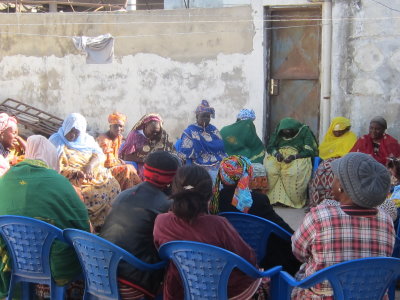
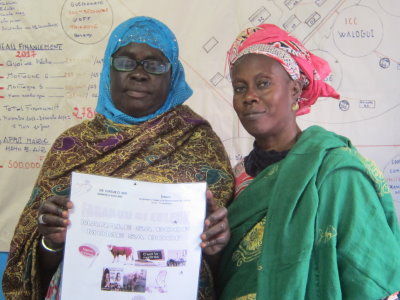
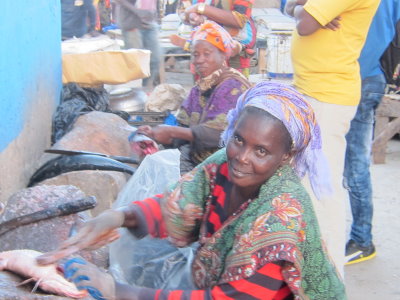
Moreover, given the crisis experienced by the fishers themselves, who are subject to real constraints of access to resources, these women are more and more challenged at the level of their respective households and communities to meet basic needs of a human being: to ensure health care, the education of the children, daily food and the acts of solidarity between members of the same communities, etc.
It is in this context with multiple challenges that the women of GIE PARASE have organised themselves since about two years by initiating a package of five products for the benefit of their members and their respective families: a health insurance; a savings mechanism for the purchase of sheep to celebrate tabaski; a solidarity fund to compensate for the loss of income of members facing problems; savings intended to cover the tuition fees of members’ children, and a famous product, called express credit, which runs between members with a recovery rate of 100%. All of these services already in place are funded from a membership fee system, well organised on the wharf and managed on a continuous basis by Ms. Khady SARR. A little more than 750 members participate in the schemes. They contribute an average of 500 F per day to supply GIE funds.
The women did not wait for anybody else to take this initiative, but now they ask Mundus maris for advice and guidance on several levels.
Firstly, they would be interested, starting from the sums they manage to mobilise between themselves, to market some species directly to the exporting plants of the place, but do not know how to achieve that. They are all the more concerned that some wholesalers, having a long tradition of collaboration with these same factories the women have in mind, will not hesitate to «put sand into the couscous» as they said.
On this specific point, the representative of Mundus maris has already played his part by putting the GIE in contact with one of the production managers of some plants located in the area of Hann Bel Air.
The second question on which the women asked for the accompanying measures of Mundus maris concerns their difficulty of access to space along the coastline. This concerns in particular the women scrubbing the scales off the fish and whose status is precarious: no space is permanently assigned to them and they can be evicted at any time. The representative of Mundus maris advised his hosts (i) that this is an issue that can be solved in a step-by-step manner through lobbying the relevant administrative authorities. Especially in a pre-election context this could be successful; (ii) he can make himself available – as soon as the group is ready – to accompany them to the Ministry in charge of the fisheries sector. A first meeting is planned in this direction in early April.
Since these women are all involved in the fresh fish trade, their main concern is the thorny problem of ice (storage on the dock and what type of containers would be suitable for urban / peri-urban fish trade). Indeed, the women of the GIE are surprised to see that a technological solution has not been found until now to the need to reduce the amount of ice while preserving the quality, whereas the fishers are able to guarantee such a quality with increasingly powerful boxes on board, despite fishing trips nowadays exceeding 10 to 15 days. The representative of Mundus maris then proposed contacts with the Ecole Polytechnique Supérieure (ESP) of Dakar, with the support of Professor Kébé of INNODEV, to explore together what is possible.
The last issue raised concerns the safety of the women descaling fish, who end up with many injuries after a day’s work. Several needs have been expressed in terms of new equipment to be made available to them according to the opinion of GIE officials. According to the women, the most urgent thing is the replacement of the tools used for scaling and the wooden planks on which the product is deposited. These boards can be a substrate for bacteria, especially when the work is done in poor sanitary conditions.
It is on these notes that the session which started around 15:00 was closed at 19:15. Pictures are by A. Sall. Click here for the interview with Khady SARR, Secretary General.
Entre tradición y la modernidad
- 2000 years ago: the ‘vivaria’
- La historia del esturión
- Mundus maris participated in the 2024 World Fisheries Day organized by Canoe and Fishing Gear Association of Ghana (CaFGOAG).
- Challenges and Opportunities in the sustainability of Inland open water fisheries in India
- April V2V lecture – Vulnerability to Viability: Mind Matters
- A glimpse at Marsaxlokk, the traditional fisheries harbour in Malta
- Entrevista con la Sra. Khady Sarr en el puerto de pesca artesanal de Hann
- Qué dicen las mujeres en la pesca artesanal en Hann?
- Women in fisheries: Interview with Ms Ramatoulaye Barry, leader of a group of women fish mongers in Conakry
- Interview with F. Soumah, leader of artisanal fishers
- A detour in the Boulbinet artisanal fishing port in Conakry, Guinea
